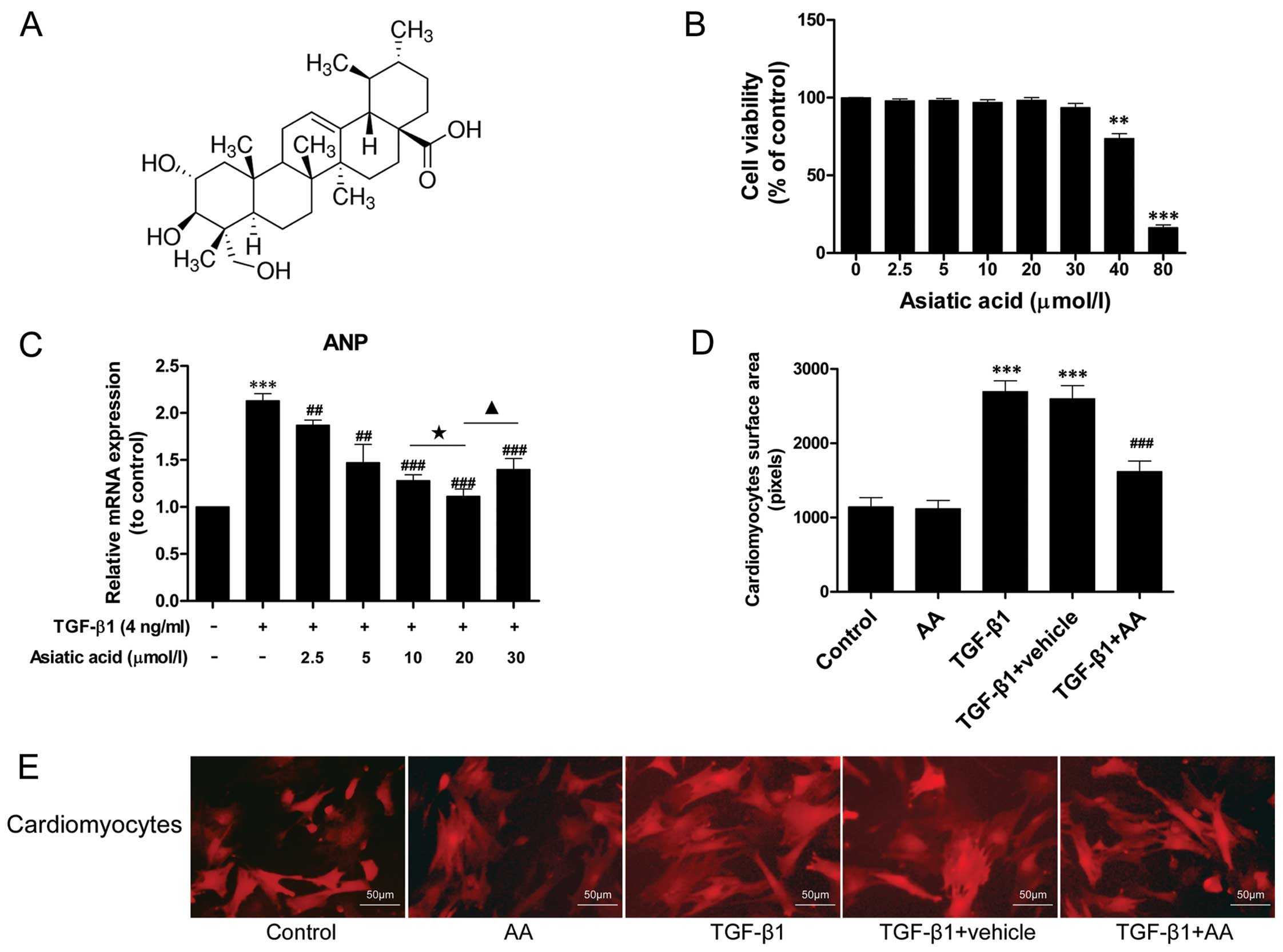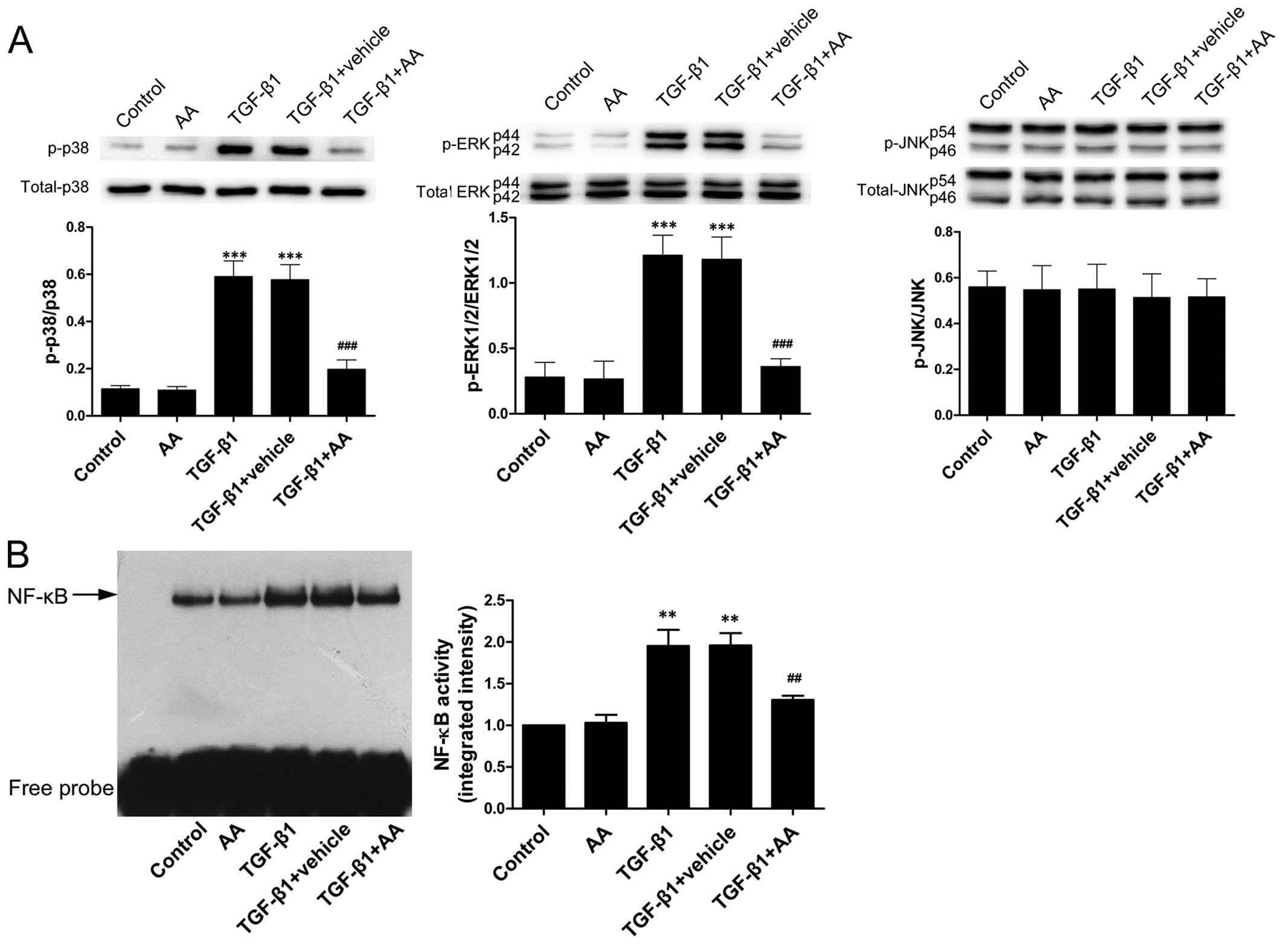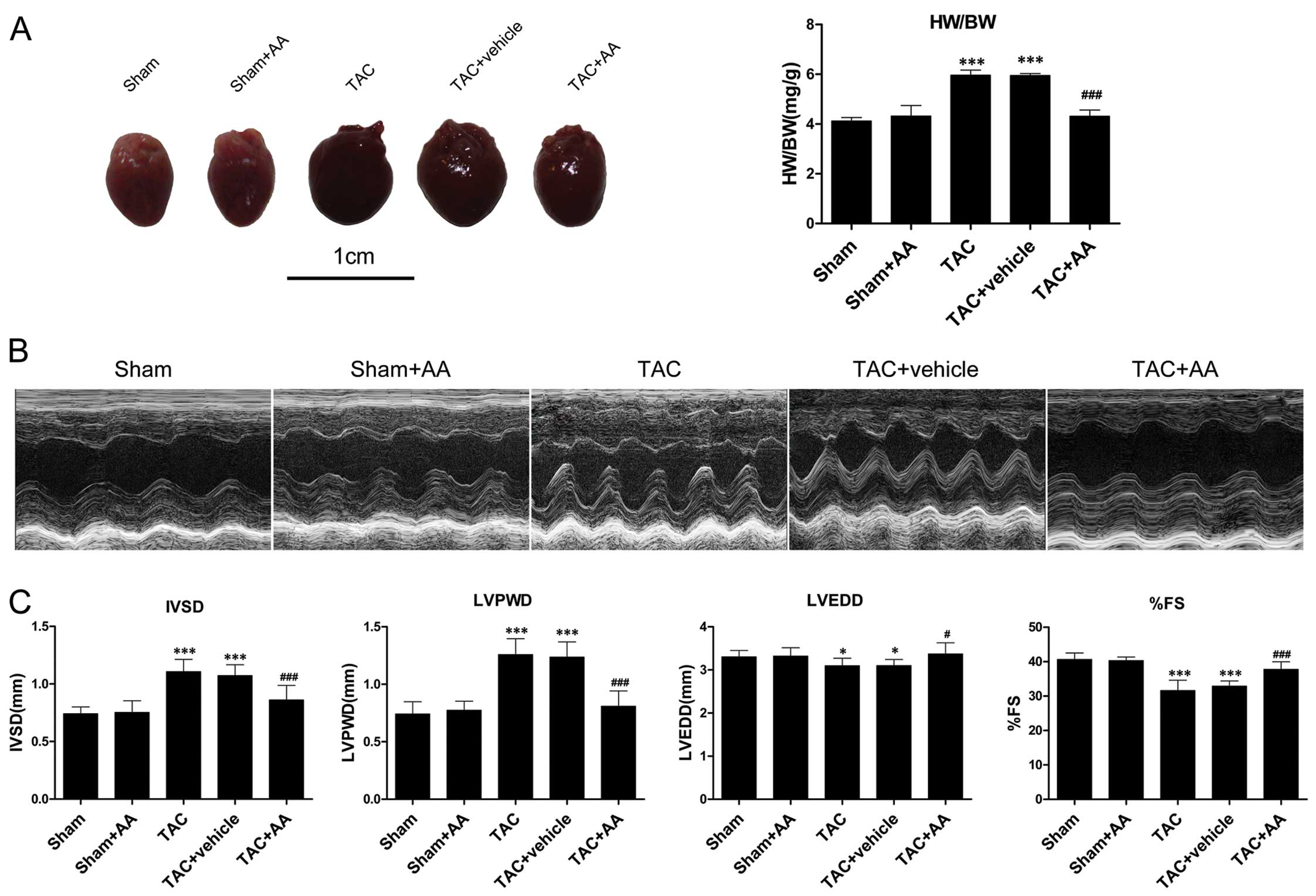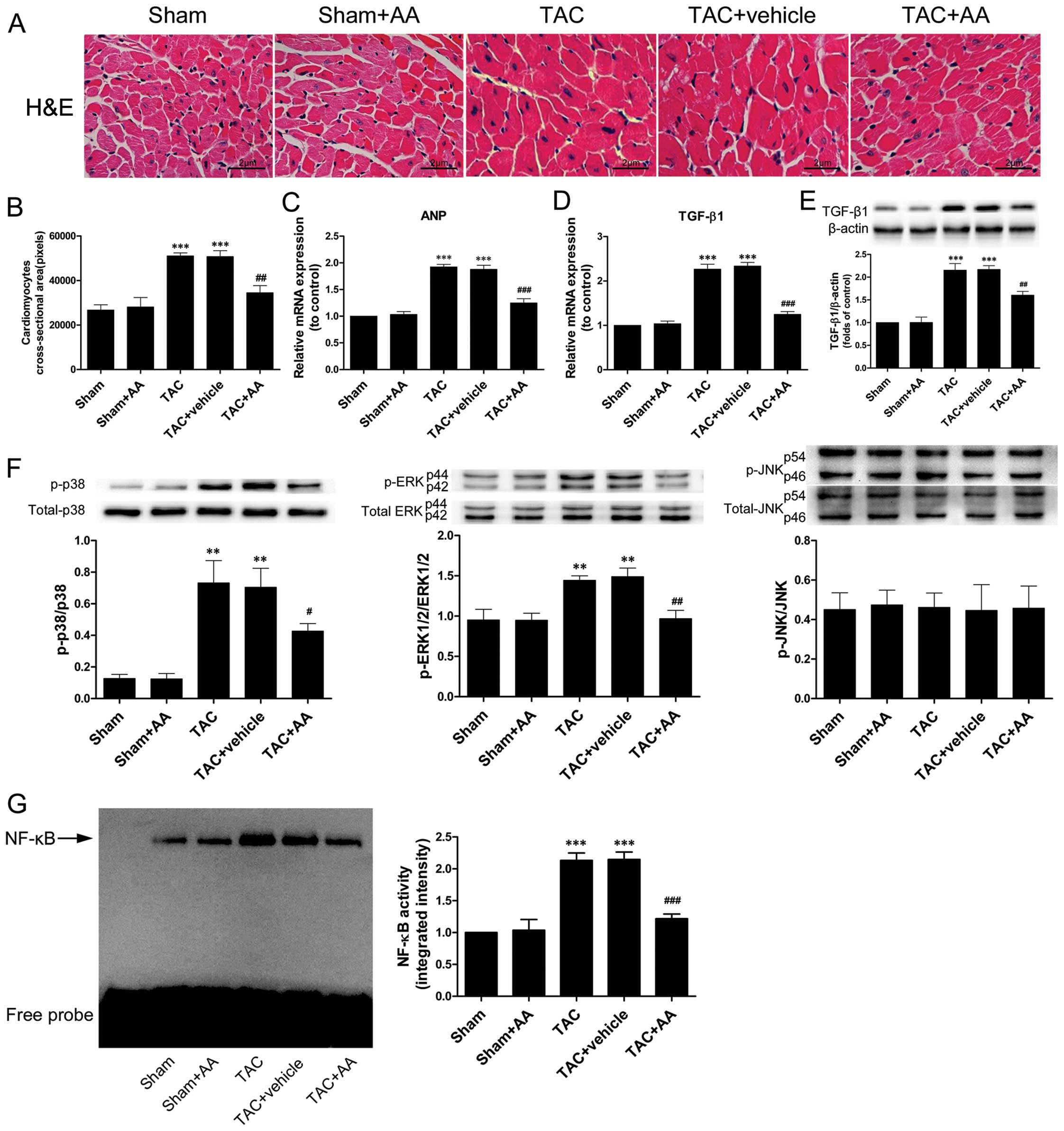|
1
|
Frohlich ED and Susic D: Pressure
overload. Heart Fail Clin. 8:21–32. 2012. View Article : Google Scholar
|
|
2
|
Ruwhof C and van der Laarse A: Mechanical
stress-induced cardiac hypertrophy: mechanisms and signal
transduction pathways. Cardiovasc Res. 47:23–37. 2000. View Article : Google Scholar : PubMed/NCBI
|
|
3
|
Heineke J and Molkentin JD: Regulation of
cardiac hypertrophy by intracellular signalling pathways. Nat Rev
Mol Cell Biol. 7:589–600. 2006. View
Article : Google Scholar : PubMed/NCBI
|
|
4
|
Lim JY, Park SJ, Hwang HY, Park EJ, Nam
JH, Kim J and Park SI: TGF-beta1 induces cardiac hypertrophic
responses via PKC-dependent ATF-2 activation. J Mol Cell Cardiol.
39:627–636. 2005. View Article : Google Scholar : PubMed/NCBI
|
|
5
|
Dobaczewski M, Chen W and Frangogiannis
NG: Transforming growth factor (TGF)-β signaling in cardiac
remodeling. J Mol Cell Cardiol. 51:600–606. 2011.
|
|
6
|
Derynck R and Zhang YE: Smad-dependent and
Smad-independent pathways in TGF-beta family signalling. Nature.
425:577–584. 2003. View Article : Google Scholar : PubMed/NCBI
|
|
7
|
Huang H, Tang QZ, Wang AB, et al: Tumor
suppressor A20 protects against cardiac hypertrophy and fibrosis by
blocking transforming growth factor-beta-activated kinase
1-dependent signaling. Hypertension. 56:232–239. 2010. View Article : Google Scholar : PubMed/NCBI
|
|
8
|
Li Y, Ha T, Gao X, et al: NF-kappaB
activation is required for the development of cardiac hypertrophy
in vivo. Am J Physiol Heart Circ Physiol. 287:H1712–H1720. 2004.
View Article : Google Scholar : PubMed/NCBI
|
|
9
|
Li HL, Wang AB, Huang Y, et al:
Isorhapontigenin, a new resveratrol analog, attenuates cardiac
hypertrophy via blocking signaling transduction pathways. Free
Radic Biol Med. 38:243–257. 2005. View Article : Google Scholar : PubMed/NCBI
|
|
10
|
Pittella F, Dutra RC, Junior DD, Lopes MT
and Barbosa NR: Antioxidant and cytotoxic activities of Centella
asiatica (L) Urb. Int J Mol Sci. 10:3713–3721. 2009. View Article : Google Scholar : PubMed/NCBI
|
|
11
|
Yun KJ, Kim JY, Kim JB, et al: Inhibition
of LPS-induced NO and PGE2 production by asiatic acid via NF-kappa
B inactivation in RAW 264.7 macrophages: possible involvement of
the IKK and MAPK pathways. Int Immunopharmacol. 8:431–441. 2008.
View Article : Google Scholar : PubMed/NCBI
|
|
12
|
Zhang X, Wu J, Dou Y, Xia B, Rong W,
Rimbach G and Lou Y: Asiatic acid protects primary neurons against
C2-ceramide-induced apoptosis. Eur J Pharmacol. 679:51–59. 2012.
View Article : Google Scholar : PubMed/NCBI
|
|
13
|
Tang LX, He RH, Yang G, et al: Asiatic
acid inhibits liver fibrosis by blocking TGF-beta/Smad signaling in
vivo and in vitro. PLoS One. 7:e313502012. View Article : Google Scholar : PubMed/NCBI
|
|
14
|
Xu XH, Xu J, Xue L, Cao HL, Liu X and Chen
YJ: VEGF attenuates development from cardiac hypertrophy to heart
failure after aortic stenosis through mitochondrial mediated
apoptosis and cardiomyocyte proliferation. J Cardiothorac Surg.
6:542011. View Article : Google Scholar
|
|
15
|
Feng JA, Perry G, Mori T, Hayashi T,
Oparil S and Chen YF: Pressure-independent enhancement of cardiac
hypertrophy in atrial natriuretic peptide-deficient mice. Clin Exp
Pharmacol Physiol. 30:343–349. 2003. View Article : Google Scholar : PubMed/NCBI
|
|
16
|
Zhu Y, Li T, Song J, et al: The
TIR/BB-loop mimetic AS-1 prevents cardiac hypertrophy by inhibiting
IL-1R-mediated MyD88-dependent signaling. Basic Res Cardiol.
106:787–799. 2011. View Article : Google Scholar : PubMed/NCBI
|
|
17
|
Li JM and Brooks G: Differential protein
expression and subcellular distribution of TGFbeta1, beta2 and
beta3 in cardiomyocytes during pressure overload-induced
hypertrophy. J Mol Cell Cardiol. 29:2213–2224. 1997. View Article : Google Scholar
|
|
18
|
Rosenkranz S, Flesch M, Amann K, et al:
Alterations of beta-adrenergic signaling and cardiac hypertrophy in
transgenic mice overexpressing TGF-beta(1). Am J Physiol Heart Circ
Physiol. 283:H1253–H1262. 2002.PubMed/NCBI
|
|
19
|
Wang Y: Mitogen-activated protein kinases
in heart development and diseases. Circulation. 116:1413–1423.
2007. View Article : Google Scholar : PubMed/NCBI
|
|
20
|
LaMorte VJ, Thorburn J, Absher D, et al:
Gq- and ras-dependent pathways mediate hypertrophy of neonatal rat
ventricular myocytes following alpha 1-adrenergic stimulation. J
Biol Chem. 269:13490–13496. 1994.PubMed/NCBI
|
|
21
|
Wang Y: Signal transduction in cardiac
hypertrophy-dissecting compensatory versus pathological pathways
utilizing a transgenic approach. Curr Opin Pharmacol. 1:134–140.
2001. View Article : Google Scholar : PubMed/NCBI
|
|
22
|
Clerk A and Sugden PH: Untangling the Web:
specific signaling from PKC isoforms to MAPK cascades. Circ Res.
89:847–849. 2001.PubMed/NCBI
|
|
23
|
Esposito G, Prasad SV, Rapacciuolo A, Mao
L, Koch WJ and Rockman HA: Cardiac overexpression of a G(q)
inhibitor blocks induction of extracellular signal-regulated kinase
and c-Jun NH(2)-terminal kinase activity in in vivo pressure
overload. Circulation. 103:1453–1458. 2001. View Article : Google Scholar
|
|
24
|
Hall G, Hasday JD and Rogers TB:
Regulating the regulator: NF-kappaB signaling in heart. J Mol Cell
Cardiol. 41:580–591. 2006. View Article : Google Scholar : PubMed/NCBI
|
|
25
|
Gordon JW, Shaw JA and Kirshenbaum LA:
Multiple Facets of NF-κB in the heart: To Be or Not to NF-κB. Circ
Res. 108:1122–1132. 2011.
|
|
26
|
Gupta S, Young D, Maitra RK, et al:
Prevention of cardiac hypertrophy and heart failure by silencing of
NF-kappaB. J Mol Biol. 375:637–649. 2008. View Article : Google Scholar : PubMed/NCBI
|


















